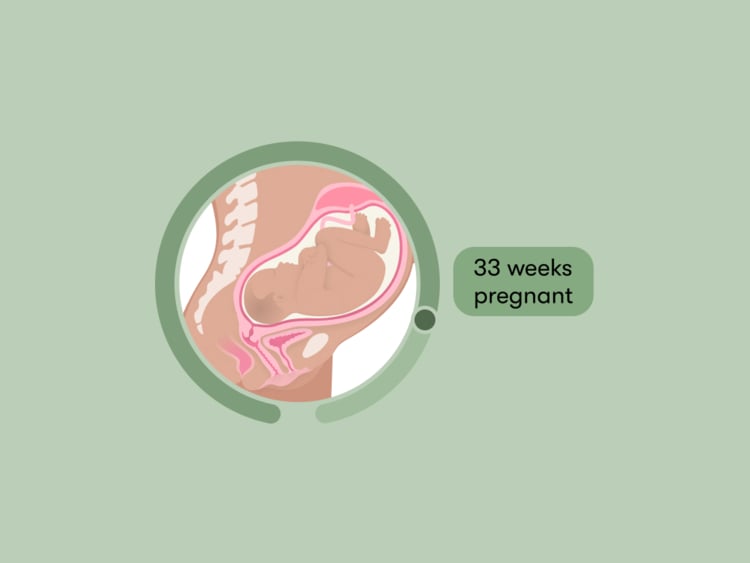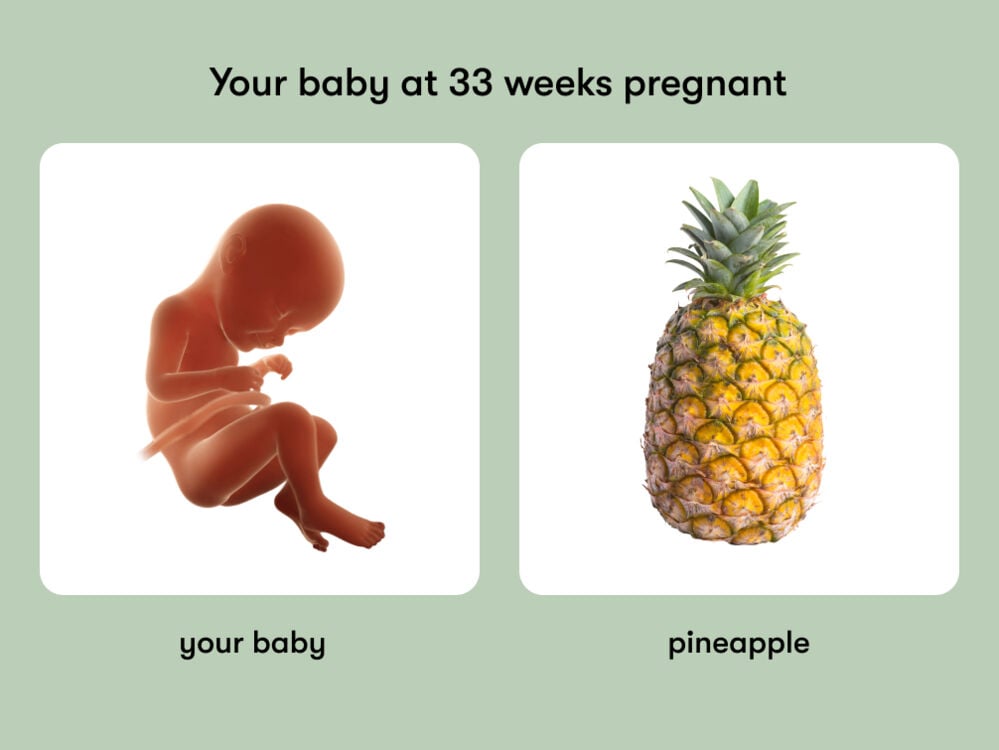From energy changes to hip pain, here’s the lowdown on being 33 weeks pregnant.
-
Tracking cycle
-
Getting pregnant
-
Pregnancy
-
Help Center
-
Flo for Partners
-
Anonymous Mode
-
Flo app reviews
-
Flo Premium New
-
Secret Chats New
-
Symptom Checker New
-
Your cycle
-
Health 360°
-
Getting pregnant
-
Pregnancy
-
Being a mom
-
LGBTQ+
-
Quizzes
-
Ovulation calculator
-
hCG calculator
-
Pregnancy test calculator
-
Menstrual cycle calculator
-
Period calculator
-
Implantation calculator
-
Pregnancy weeks to months calculator
-
Pregnancy due date calculator
-
IVF and FET due date calculator
-
Due date calculator by ultrasound
-
Medical Affairs
-
Science & Research
-
Pass It On Project New
-
Privacy Portal
-
Press Center
-
Flo Accuracy
-
Careers
-
Contact Us
33 weeks pregnant: Your guide to this week of your third trimester


Every piece of content at Flo Health adheres to the highest editorial standards for language, style, and medical accuracy. To learn what we do to deliver the best health and lifestyle insights to you, check out our content review principles.
Now that you’re 33 weeks pregnant, you may be curious about what symptoms you can expect to experience. As your due date draws nearer, you’re likely to be paying extra attention to how your body is feeling. Keep reading to hear advice from a Flo expert about the changes to look out for, as well as what your baby is up to this week inside your growing tummy.
Your baby at 33 weeks pregnant
Baby has a fully developed brain
This week marks a major milestone: Your baby’s brain and nervous system are now fully developed. However, they still need some time to mature, as right now some of their reflexes and limb movements won’t be fully coordinated.
Baby can detect light
At 33 weeks, your baby can now detect light, and their pupils will change size depending on the brightness. Within a couple of weeks after birth, they will be able to see light and dark ranges and patterns.
How big is a baby at 33 weeks?
Length (crown to heel): 44 cm or 17.3 in.
Weight: 2.2 kg or 4.8 lb.
Size: Equivalent to a pineapple
All measurements are approximate and vary within the normal range.

Your body at 33 weeks pregnant
Energy changes
You may be feeling more tired now, which can be one of the common third trimester symptoms. Considering the baby you’re carrying now weighs around a couple of kilograms, this is hardly surprising! You may also be having sleeping problems that are making you tired. Common causes of sleeplessness in pregnancy are struggling to get comfortable in bed (thanks to your growing belly), having strange dreams or needing the bathroom in the night due to the increased pressure on your bladder. It’s important to remember that when you’re pregnant, taking time to rest isn’t lazy or a luxury. Your body needs it, so be kind to yourself and try to relax as much as possible. And if your family, friends or colleagues offer to take things off your plate, let them!
Hip pain
There are a number of reasons why you might be experiencing hip pain as one of your symptoms at 33 weeks pregnant. “Hip pain can be a normal response to the increased demands on your muscles and bones during pregnancy,” explains Dr. Jenna Beckham, Obstetrician and gynecologist, WakeMed, North Carolina, US.
It can also be caused by a new sleeping position. As you’re no doubt already aware, sleeping on one side is the safest position in pregnancy, especially after you’re 28 weeks pregnant. While it’s definitely the right thing to do, this position can put increasing pressure on your hip as your baby grows. In some cases, the pressure can irritate the hip area to the extent that it causes pain.
If you’re struggling with hip pain, things like sleeping on the opposite side, trying some gentle exercises and stretches or using a pregnancy pillow can help.
Take a quiz
Find out what you can do with our Health Assistant
Your questions answered
What should you avoid doing at 33 weeks pregnant?
Good news: “There are no specific limitations or restrictions that start at 33 weeks pregnant,” reassures Dr. Beckham. So in that case, just keep in mind all the usual things to watch out for in pregnancy. To recap, some of the activities you should avoid in pregnancy are:
- Contact sports, including ice hockey, boxing, soccer, and basketball
- Extreme sports like skydiving or scuba diving
- Any activity that comes with a risk of falling, like skiing, surfing or off-road cycling
- Hot yoga or any activity that risks you overheating
- Exercising in high altitude (above 6,000 feet) unless you already live in a high altitude area
- Lying on your back for longer than a few minutes
Meanwhile, a few of the key food and drinks to avoid are:
- Alcohol
- Consuming more than 200mg of caffeine a day
- Eating more than two portions of oily fish a week
- Raw or uncooked meat
- Certain cheeses, such as brie, camembert, gorgonzola and roquefort
Is it safe to deliver at 33 weeks?
It can be safe to deliver at 33 weeks pregnant, as babies born at this stage have a good chance of survival. However, babies born at 33 weeks would be considered moderately preterm and may need extra care, for example in a neonatal unit. It’s unlikely to come to that though, as only 6–7% of babies are born at moderate to late preterm, or between 32–36 weeks.
Is a baby fully developed at 33 weeks?
Your baby will not be fully developed, or considered full term, until 39 weeks pregnant — so they’ve still got some growing to do yet! You’re now in your ninth month, which is when the finishing touches to your baby’s growth and brain development take place. Your 10th month starts from 37 weeks pregnant. During this final month your baby continues gaining weight and you could go into labor at any time. So while your 33 week baby is not fully developed, you can definitely start the final countdown.
33 weeks pregnant to do checklist
Get vitamin D
Vitamin D, sometimes known as the sunshine vitamin, works with calcium to help your baby’s bones and teeth develop. Whether pregnant or not, we actually all need 600 international units of vitamin D everyday, which is also essential for healthy eyesight and skin.
During the summer, most people should be able to get all the vitamin D they need from sunlight. You can also get vitamin D from certain foods, like fortified milk and breakfast cereals and egg yolks.
However, many people don’t get enough vitamin D and can benefit from taking a supplement. But before you add them to your shopping bag, remember, it’s always a good idea to speak to your health care provider before taking any new supplements or medications while pregnant.
When to consult a doctor at 33 weeks pregnant
Right now, you may be having a prenatal checkup with your doctor every two weeks. In the final month of your pregnancy, from 36 weeks onwards, this may increase to every week. However, how often you see your doctor will depend on where you live, as well as what you and your doctor decide is right for you and your baby.
You don’t need to wait until your appointment if you have any concerns or questions about your pregnancy. However, at 33 weeks pregnant, you should contact your doctor immediately if you experience:
- Severe cramping
- Vaginal bleeding
- Changes in vaginal discharge
- Fever
- Dizziness or fainting
- Severe vomiting
- Severe headaches or blurry vision
- Intense heartburn
- A decrease in the amount you feel your baby move
- A loss of liquid from your vagina or watery/mucus-like discharge (this could be a sign of premature labor)
This isn’t an exhaustive list and just an example of some of the changes you should look out for. Some of these can be a sign of health complications, so it’s essential that you speak to your doctor about the best next step for you. And if you’re ever worried about any other symptoms you experience during pregnancy, then don’t hesitate to reach out to your health care provider.
33 weeks pregnant: The takeaway
As you’re nearing the end of your pregnancy, you might have more tiredness, aches and pains to contend with. Go easy on yourself and call on others for support when you need it — growing a tiny human is no mean feat, after all.


Hey, I'm Anique
I started using Flo app to track my period and ovulation because we wanted to have a baby.


The Flo app helped me learn about my body and spot ovulation signs during our conception journey.


I vividly
remember the day
that we switched
Flo into
Pregnancy Mode — it was
such a special
moment.
Real stories, real results
Learn how the Flo app became an amazing cheerleader for us on our conception journey.
References
“33 Weeks Pregnant.” NHS, www.nhs.uk/start4life/pregnancy/week-by-week/3rd-trimester/week-33/. Accessed 11 July 2023.
“Bleeding during Pregnancy.” The American College of Obstetricians and Gynecologists, May 2021, www.acog.org/womens-health/faqs/bleeding-during-pregnancy.
“Exercising in Pregnancy.” NHS, www.nhs.uk/start4life/pregnancy/exercising-in-pregnancy/. Accessed 11 July 2023.
“Fetal Development: What Happens during the 3rd Trimester?” Mayo Clinic, 3 June 2022, www.mayoclinic.org/healthy-lifestyle/pregnancy-week-by-week/in-depth/fetal-development/art-20045997.
“Fetal Development.” Cleveland Clinic, https://my.clevelandclinic.org/health/articles/7247-fetal-development-stages-of-growth. Accessed 15 June 2023.
“Fetal Development.” Perinatology, perinatology.com/Reference/Fetal%20development.htm#. Accessed 11 July 2023.
Field, David, et al. The Late And Moderately Preterm Birth Study. NIHR Journals Library, 2016. www.ncbi.nlm.nih.gov/books/NBK349423
“Foods to Avoid in Pregnancy.” NHS, www.nhs.uk/pregnancy/keeping-well/foods-to-avoid/. Accessed 11 July 2023.
Friel, Lara A. “Fevers during Pregnancy.” MSD Manual Consumer Version, Oct. 2021, www.msdmanuals.com/home/women-s-health-issues/pregnancy-complicated-by-disease/fevers-during-pregnancy.
“Hip pain in pregnancy: Greater trochanteric pain syndrome (GTPS).” NHS Royal Berkshire, www.royalberkshire.nhs.uk/media/313nobgt/physio-hip-pain-in-pregnancy-gtps_nov21.pdf. Accessed 11 July 2023.
Holloway, Cassandra. “8 Best Ways to Improve Sleep during Your Pregnancy.” Cleveland Clinic, 13 May 2019, health.clevelandclinic.org/8-best-ways-to-improve-sleep-during-your-pregnancy.
Jhaveri, Stacie. “How Often Do You Need Prenatal Visits?” Cleveland Clinic, 14 Jan. 2022, health.clevelandclinic.org/prenatal-appointment-schedule/.
Khoshnood Shariati, Maryam, et al. “Perinatal Complications Associated with Preterm Deliveries at 24 to 33 Weeks and 6 Days Gestation (2011- 2012): A Hospital-Based Retrospective Study.” Iranian Journal of Reproductive Medicine, vol. 13, no. 11, Nov. 2015, pp. 697–702. www.ncbi.nlm.nih.gov/pmc/articles/PMC4695684/
"Kick Counts.” Cleveland Clinic, my.clevelandclinic.org/health/articles/23497-kick-counts. Accessed 14 June 2023.
“Morning Sickness: Nausea and Vomiting of Pregnancy.” The American College of Obstetricians and Gynecologists, May 2020, www.acog.org/womens-health/faqs/morning-sickness-nausea-and-vomiting-of-pregnancy.
“My Premature Baby’s Development in the Womb-Week 33.” Tommy’s, www.tommys.org/pregnancy-information/premature-birth/my-premature-babys-development-womb-week-33. Accessed 11 July 2023.
“Nutrition During Pregnancy.” ACOG, www.acog.org/womens-health/faqs/nutrition-during-pregnancy. Accessed 11 July 2023.
“Pregnancy And Exercise.” ACOG, www.acog.org/womens-health/faqs/exercise-during-pregnancy. Accessed 11 July 2023.
“Pregnancy and Heartburn: Causes & Management.” Cleveland Clinic, my.clevelandclinic.org/health/diseases/12011-heartburn-during-pregnancy. Accessed 14 June 2023.
“Premature Birth.” Mayo Clinic, 25 Feb. 2023, www.mayoclinic.org/diseases-conditions/premature-birth/symptoms-causes/syc-20376730.
“Preterm Labor.” Mayo Clinic, 8 Feb. 2022, www.mayoclinic.org/diseases-conditions/preterm-labor/symptoms-causes/syc-20376842.
“Tiredness and Sleep Problems.” NHS, www.nhs.uk/pregnancy/related-conditions/common-symptoms/tiredness/. Accessed 26 June 2023.
“Tiredness in Later Pregnancy.” HSE, www2.hse.ie/conditions/tiredness-fatigue-pregnancy/later-pregnancy/. Accessed 11 July 2023.
“Urgent Maternal Warning Signs.” Centers for Disease Control and Prevention, 27 Feb. 2023, www.cdc.gov/hearher/maternal-warning-signs/index.html.
“Vaginal Discharge in Pregnancy.” NHS, www.nhs.uk/pregnancy/related-conditions/common-symptoms/vaginal-discharge/. Accessed 14 June 2023.
“Vision Development: Newborn to 12 Months.” American Academy of Ophthalmology, 1 Feb. 2022, www.aao.org/eye-health/tips-prevention/baby-vision-development-first-year.
“Vitamin D.” NHS, www.nhs.uk/conditions/vitamins-and-minerals/vitamin-d/. Accessed 11 July 2023.
“You and Your Baby at 33 Weeks Pregnant.” NHS, www.nhs.uk/pregnancy/week-by-week/28-to-40-plus/33-weeks/. Accessed 11 July 2023.
History of updates
Current version (25 August 2023)
Published (24 February 2019)
In this article

Get your personal guide to pregnancy with the Flo app
-
Follow your baby's growth week by week
-
Get expert info on symptoms, safe foods, and more
-
Chat with other parents-to-be




